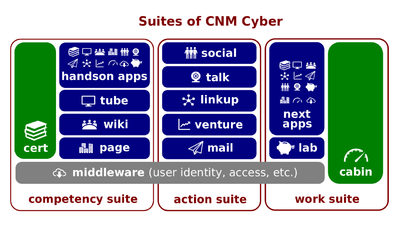Job Market Essentials
The Job Market Essentials (hereinafter, the Lesson) is the lesson of CNMCyber that introduces its participants to essentials and related concepts for job market. The Lesson belongs to the Introduction to Careers session of EmployableU Concepts.
The Lesson is made up of five lectios. At CNMCyber, the word, lectio, is used for a lesson part.
Contents
Summaries
Predecessor
- The predecessor lesson is Employment Credentials.
Outline
Successor
- The successor lesson is Workforce Services.
2019 Job Marketing presentation
Overview
- Welcome to Job Marketing. In this brief presentation, we are going to take a look at what may qualify one for working in a particular occupation and/or in particular industry. Let's start-off.
Resumes
- Because of many credentials, many employers are looking for some directory of credentials, the most popular directory is resume. This is any document a person uses to present his/her achievements and capacities in the industry of work force services. Resume usually presents credentials applicable to a particular employment. Here, I need to say that your resume is not a story of your life. It is basically a summary of what you did in your previous life. Your credentials but only those credentials which are applicable to an employment which you are looking for.
Bios
- Another example it could be a professional bio, it`s a descriptive account of a person`s professional history, it could be a list of professional recognitions, or education credentials. It could be a list of worked projects, list of key accomplishments. Once again, every of these directories can be both. It can list everything you have, maybe for your own reference like a master resume or a master bio. At the same time, it could be more specified to your employment where for instance from the list of all your professional recognitions or all worked projects you just choose those which are applicable to a particular employment which you are looking for.
Portfolios
- Professional portfolios is organized presentations of those individual credentials that demonstrate his/her professional achievements and capacities and usually professional portfolios are created for some particular job so someone can take or keep this portfolio just in case put in all the works but for a particular employment it, it makes sense to create specialized portfolio. Especially if this employment is very new because working with portfolios takes time and effort and technically time is money so it can be expensive too.
- There are many types of portfolios, for instance working portfolio is the portfolio of work which you already are doing, for me, my working portfolio is wiki side. If someone asks me what I am doing right now, I will direct them to the wiki pages and view my contributions.
- Another type of portfolio is showcase and usually it`s good in both demonstration of ones` abilities and a platform for self-expression. Designers very often use showcase portfolio. An electronic or digital form of showcase portfolio is called electronic portfolio or e-portfolio, digital portfolio, line portfolio. You can name them.
- Credential portfolio. This is a more strict type of portfolio. It provides it`s viewers with ones’ credentials in one place. So if someone say`s in your resume I have this certificate or this diploma, someone can go there and take a look at this with the details for this certificate. Credential, some credentials are self-declared, some credentials are discovered during their screening, so let`s say your good performance at the interview can be a credential itself and this is assessed by your employer. But in some cases third party credentials come into the play. Third party credentials are credentials issued by a third party, not your employer but someone else. Some of them are government regulator, employment organizations, or work permit or criminal records. For some jobs, criminal records are very important.
Summary
- This concludes the Job Marketing presentation. We have defined employment credentials and taken a look at some of them including self-declared credentials and third-party credentials. Special considerations were given to professional credentials such as professional licenses, trade certificates, work experiences, work sample tests, and others. Quick stops were made by directories of credentials such as résumés, professional bios, and portfolios. If you haven't done yet so, you are now welcome to move to Workforce Services.
